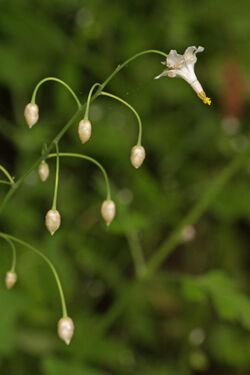Biology:Vancouveria hexandra
From HandWiki
Short description: Species of flowering plant
| Vancouveria hexandra | |
|---|---|

| |
| Vancouveria hexandra in Seattle, Washington | |
| Scientific classification | |
| Kingdom: | Plantae |
| Clade: | Tracheophytes |
| Clade: | Angiosperms |
| Clade: | Eudicots |
| Order: | Ranunculales |
| Family: | Berberidaceae |
| Genus: | Vancouveria |
| Species: | V. hexandra
|
| Binomial name | |
| Vancouveria hexandra (Hook.) C.Morren & Decne.
| |
Vancouveria hexandra, the white inside-out flower, is a perennial herb in the barberry family Berberidaceae. It is found in southwestern British Columbia, western Washington and Oregon and northwestern California and is a common understory herb in moist, shady Douglas fir forests.[1][2]
This plant grows 20–40 centimetres (8–16 in) high with compound leaves in triplets and is usually found in dense patches. It gets its name from the small delicate white flowers with petal-like sepals that are swept back abruptly as if in the process of turning inside out. The genus honors George Vancouver, the 18th-century explorer of the Pacific Northwest.[3][4][5]
References
- ↑ Sullivan, Steven. K. (2015). "Vancouveria hexandra". http://www.wildflowersearch.com/search?&PlantName=Vancouveria+hexandra. Retrieved 2015-04-23.
- ↑ "Vancouveria hexandra". United States Department of Agriculture; Natural Resources Conservation Service. 2015. http://plants.usda.gov/java/profile?symbol=VAHE. Retrieved 2015-04-23.
- ↑ Giblin, David (Editor) (2015). "Vancouveria hexandra". Burke Museum, University of Washington. http://biology.burke.washington.edu/herbarium/imagecollection.php?Genus=Vancouveria&Species=hexandra. Retrieved 2015-04-23.
- ↑ "Vancouveria hexandra". Jepson Herbarium; University of California, Berkeley. 2015. http://ucjeps.berkeley.edu/cgi-bin/get_IJM.pl?tid=Vancouveria%20hexandra. Retrieved 2015-04-23.
- ↑ Yamamoto, Hirobumi; Yan, Kuang; Ieda, Kyoko; Tanaka, Toshiyuki; Iinuma, Munekazu; Mizuno, Mizuo (July 1993). "Flavonol glycosides production in cell suspension cultures of Vancouveria hexandra". Phytochemistry 33 (4): 841–846. doi:10.1016/0031-9422(93)85287-2.
External links
Wikidata ☰ Q7914286 entry

